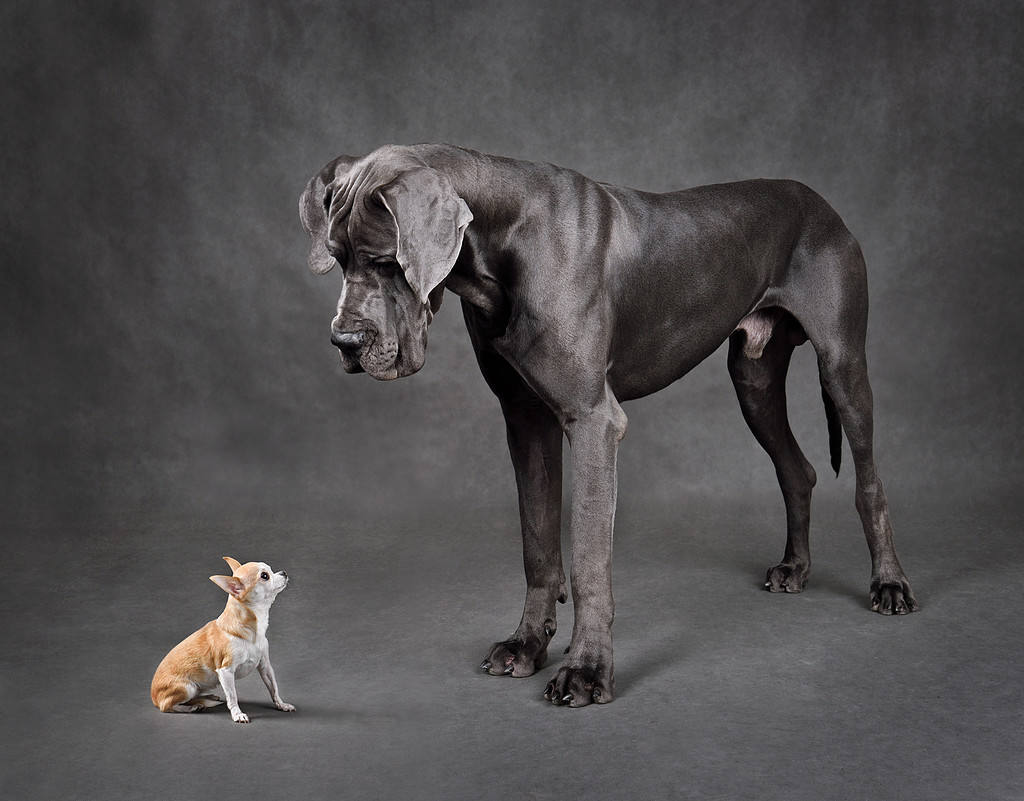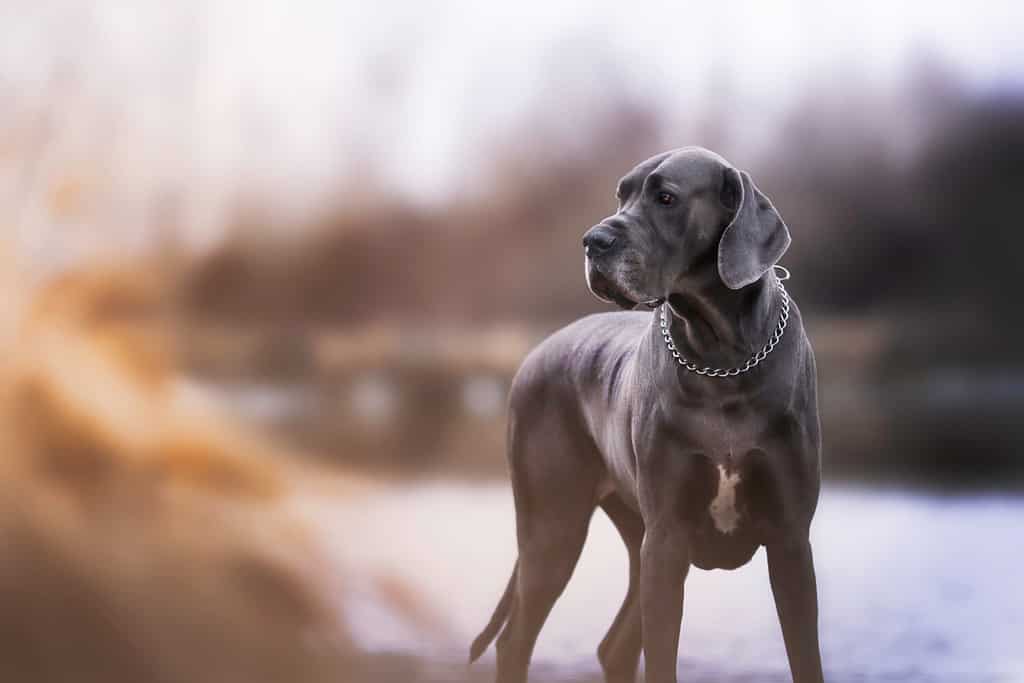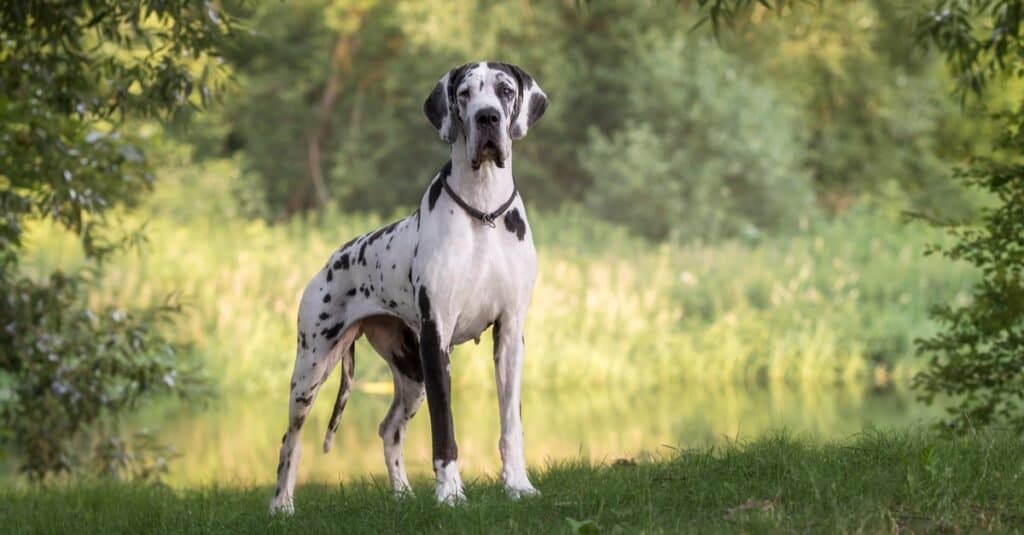Great Danes are often considered “gentle giants.” However, they were kept as guard dogs for centuries before they became the pets we know them as today. Much of these guarding instincts have been bred out, though you may still find a breeder or two that breeds protective Great Danes.
While they aren’t traditional guard dogs, there are some reasons you may want to consider Great Danes as guard dogs:
1. Imposing Size
Great Danes simply look scary. They’re one of the largest dog breeds in the world, which can make them very imposing. While they’re generally known as “gentle giants,” that doesn’t mean that everyone will be comfortable around them.
Simply having a guard dog in your house may be enough to prevent some intruders from entering, especially if they can’t tell exactly what kind of dog they are through the window! A big dog with a powerful bark is plenty to send many trespassers on their way.
2. Protective Instincts

Great Danes are exceptionally large, which may be enough to scare off potential trespassers.
©eAlisa/iStock via Getty Images
Great Danes can possess some protective instincts. Many are not protective at all and live up to the “gentle giant” name. However, breeding can have a huge effect on this breed, with some breeders purposefully breeding dogs with some of the older guarding instincts still intact.
You may have to research breeders in your area that produce Great Danes for guarding purposes. Most of these guard dogs are pretty gentle and friendly with their family members, but they can be protective if they sense a threat.
Of course, socialization is vital so that these dogs can figure out what is a threat and what isn’t with some accuracy. if they are never around new people, they may assume everyone is a threat, which can be dangerous. If you plan on using a Great Dane as a guard dog, it is vital that you take extra time to socialize them.
3. Loyalty
Great Danes love their families, and it shows. They form strong bonds with their owners and are very likely to be loyal to their families. When faced with a threat, this trait is absolutely necessary for any guard dog. Their loyalty to their family must overrule any self-preservation and fear that they have.
These canines are known for bonding closely with their owners, including the children of the family. Careful training can help deepen this bond, making these dogs even better at guarding the family and property.
4. Alertness

On top of being good guard dogs, Great Danes can also be good watchdogs, alerting their family to potential dangers.
©verky01/Shutterstock.com
Great Danes are decently alert dogs. They tend to be vigilant, and their loud bark is very imposing (though they don’t tend to bark all that much). They’re faster at picking up changes in their surroundings than most owners are, making them great watchdogs and guard dogs.
Even if your Great Dane is really just a cuddle bug, they can be very useful for letting you know when something is off on your property. Plus, as we explained above, sometimes their loud bark is enough to scare off potential intruders.
5. Training Potential
Great Danes tend to be pretty trainable, especially when you start early. When properly socialized and taught basic cues, Great Danes are controllable and tend not to be aggressive. Of course, many people interpret “gentle giant” to mean that these dogs are friendly and receptive to strangers as a default, but this isn’t the case.
Just like with any breed, socialization and training are both cornerstones to producing a safe, discerning Great Dane. Socialization becomes even more important if you’re going to raise your Great Dane as a guard dog. You don’t want them to think that everyone who shows up on your doorstep is an enemy.
Luckily, Great Danes socialize and train easily, so these important steps aren’t all that difficult for a committed owner.
6. Good with Children

Get your Great Dane around
tonsof children at a young age, especially if you purchase one that will likely have stronger protective instincts.
©Al_Er/Shutterstock.com
Great Danes tend to be good with children, especially considering their size. Of course, proper socialization is important. If you want your dog to be good with kids, it’s important that they are around children of all ages at a young age. This socialization should include children outside your family, as well.
You don’t want your Great Dane trying to guard anything against a child, so they should be exceptionally well-socialized with kids. They should also be exposed to roughhousing and taught that this sort of behavior is okay. Sadly, many protective Great Danes may try to protect their children from other children when they misinterpret roughhousing, leading to potential injuries.
The photo featured at the top of this post is © Sarka Nemeckova/Shutterstock.com
Ready to discover the top 10 cutest dog breeds in the entire world?
How about the fastest dogs, the largest dogs and those that are -- quite frankly -- just the kindest dogs on the planet? Each day, AZ Animals sends out lists just like this to our thousands of email subscribers. And the best part? It's FREE. Join today by entering your email below.
Thank you for reading! Have some feedback for us? Contact the AZ Animals editorial team.







